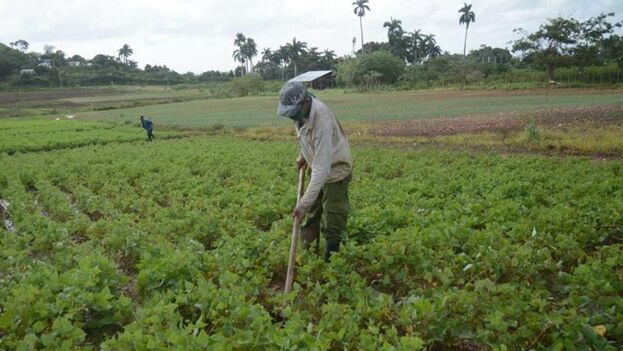
![]() 14ymedio, Havana, 9 March 2023 — The plan to move food production to the local level is going badly for the moment. The province of Artemisa evaluated the results of these first months on Monday in a meeting led by Cuban President Miguel Díaz-Canel, which was also attended by Prime Minister Manuel Marrero and other senior leaders, only to verify that “much is still to be done” and “the potential is not exploited,” something that independent economists had been warning since the decision to decentralize the sector was made.
14ymedio, Havana, 9 March 2023 — The plan to move food production to the local level is going badly for the moment. The province of Artemisa evaluated the results of these first months on Monday in a meeting led by Cuban President Miguel Díaz-Canel, which was also attended by Prime Minister Manuel Marrero and other senior leaders, only to verify that “much is still to be done” and “the potential is not exploited,” something that independent economists had been warning since the decision to decentralize the sector was made.
The Cuban economist Elías Amor, who has lived in Spain for years, summarizes the situation in a couple of phrases: “The communists are committed to this change of structure and management of resources because the budget of the central State can no longer suffice, and they need to transfer expenses to the territories, where the collection of taxes is usually greater. But they don’t realize that by imposing this model what they really do is transfer the inefficiencies and poor functioning of the central communist state to the territories.”
The expert dedicates this Tuesday an analysis on his blog to the meeting of the Cuban leadership and expresses his opinion on the “structural changes” of food production forcefully. “Municipalities do not serve to produce enough food,” he says. From his point of view, the new policy is already showing signs of failure and will widen “the differences between Cubans based on residing in one area or another of the territory,” among other things.
Another Cuban economist, Pedro Monreal, relies on figures that show that the private sector is an emerging contributor in many products and a leader in the majority compared to the state sector. “The ’structural’ changes in Cuban agriculture that prioritize state companies subordinate to the municipality and focused on local supply could relegate support to the component where the greatest proven supply response capacity exists: the private sector,” he says.
Monreal exhibits a graph with data from January to September 2021, in which it is observed that the private sector literally swallowed other forms of production both in fruit trees (84%), beans (75%), vegetables (76%), meats (75.5%) and corn (73%). The State won the game in animal protein, especially in eggs (80%), more modestly in pork (63%, although many individuals raise animals without declaring them) and cattle (61%), where the private sector has significant figures for its position (13.5%, 36.6% and 24.6%) respectively. Finally, rice production is leading by the state Basic Units of Cooperative Production with 37%, but the private ones are not far behind and contribute 35.4% to the total.
With the figures in hand, Monreal concludes: “Cuban private agriculture is already a mainstay of food security, but it is necessary to move towards a modern private agriculture that allows the results to multiply in the short and medium term.”
For that reason, the expert emphasizes that the Cuban authorities should face the problem and change the model by giving legal guarantees to farmers and land in usufruct, access to credits and markets, allowing the competitive formation of prices and prohibiting monopolies.
“In a new agricultural model in Cuba, local systems, national distance supply systems and exports should coexist, as well as direct relations between national private actors and foreign investors,” concludes Monreal, who ventures to suggest changes in agricultural policy without specifying more.
Cuban leaders, however, spoke on Monday about “eliminating obstacles” to the current model and, as in recent months, took advantage of the recent decentralization to shake off their responsibility for the poor evolution of the indicators. At this point it is already known that the meat plan and the sugar plan will not be fulfilled — the latter, they said, is one of the most deteriorated in the province — in addition to the plan for international tourists in Artemisa. The governor, Ricardo Concepción Rodríguez, attributed it to “subjectivity and ignorance in the application of the Food Sovereignty and Nutrition Education Law.”
The local leader maintained that, of the 111 commitments “generally made” in January, 72 have been fulfilled, 24 have not and another 21 “have a chance of being fulfilled,” a balance that would not be so bad if it were translated into results. Manuel Marrero summarized it this way: “If the results of the analyses and commitments that have been made in this context are not seen at the family table, we will not have achieved anything.”
Díaz-Canel included among the future challenges the control of the livestock census, an issue that drives producers mad, tired of being required to comply with adequate indicators of the number of animals they declare at the same time that they are not paid with due speed or in the appropriate currency to maintain their herd of cattle, which, in turn, results in new breaches and penalties.
“Local leaders should confront the central government for this imposition that can only lead them into chaos,” suggests Elías Amor, who finishes by saying, “Everyone knows that the formula is useless, but everyone advances united in the disaster.”
Translated by Regina Anavy
____________
COLLABORATE WITH OUR WORK: The 14ymedio team is committed to practicing serious journalism that reflects Cuba’s reality in all its depth. Thank you for joining us on this long journey. We invite you to continue supporting us by becoming a member of 14ymedio now. Together we can continue transforming journalism in Cuba.
